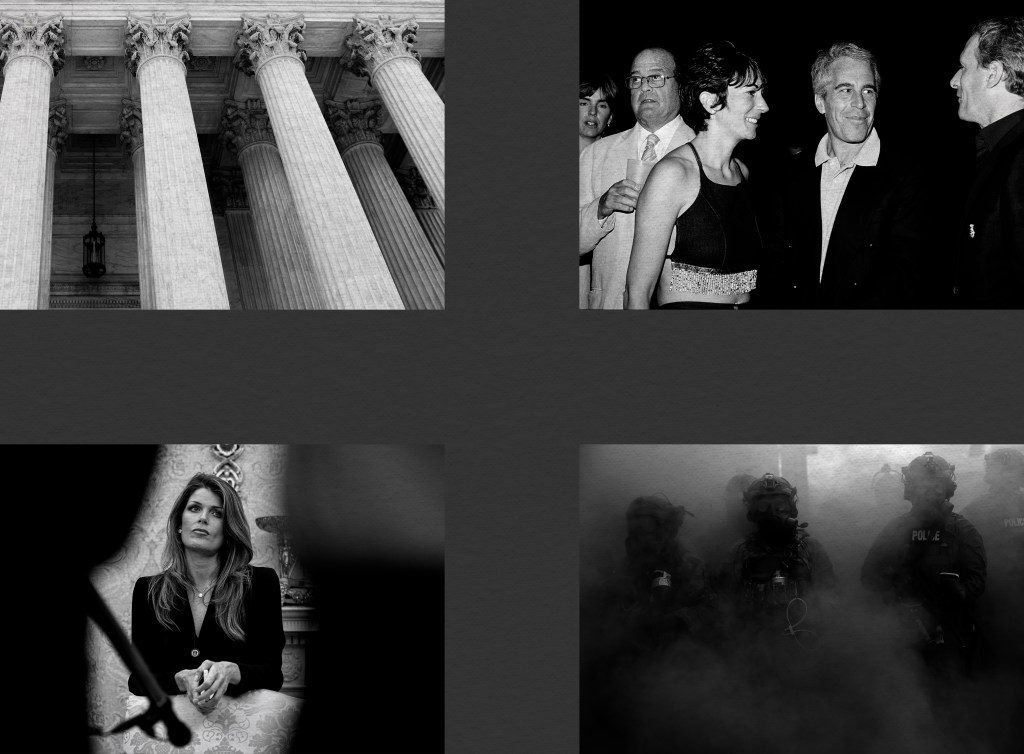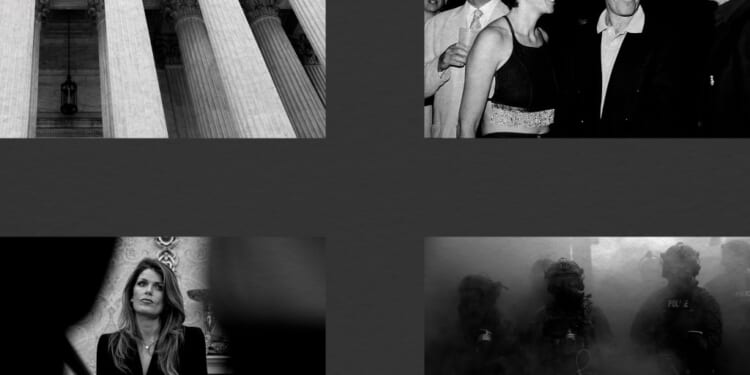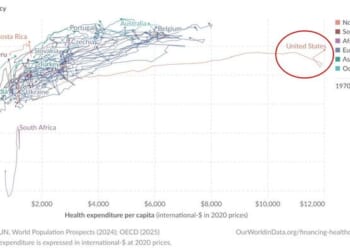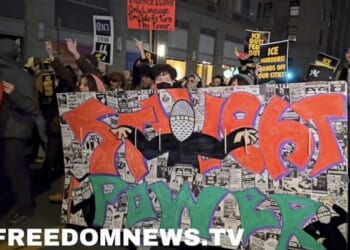
As others noted, Maxwell wouldn’t be the first child predator Donald Trump has pardoned this year. One of the January 6 goons he freed was convicted of receiving child pornography in July. Two others were arrested afterward on suspicion of sex crimes against children that they allegedly committed years before the riot at the Capitol.
In fact, numerous insurrectionists sprung from prison by the president either had criminal records or pending criminal charges for offenses “including rape, sexual abuse of a minor, domestic violence, manslaughter, production of child sexual abuse material and drug trafficking,” according to NPR. One pardoned rioter was killed by police days after he was released when they stopped his car for a traffic-related felony and he lunged for a weapon, apparently intending to kill himself.
MAGA hasn’t had any trouble “coming back” from all this, never mind how it detonates the moral case against big-city left-wing prosecutors for setting dangerous people loose on the streets. If Maxwell ends up being freed and grooming more kids for the pleasure of her next pervert-benefactor, rest assured that the right will take much less of an interest in her victims than it has in Iryna Zarutska.
I’ve written many times about the logic of Trump’s pardons, so we don’t need to belabor that subject. Suffice it to say that the president shares the instincts of Nazi jurist Carl Schmitt, a thinker currently in vogue among postliberal intellectuals: There are friends and there are enemies, and the law properly applies to only one of them.
The nice thing about pardons, though (I use the word “nice” loosely), is that they happen only when the legal system is functioning—sort of—normally: Pardons mean that prosecutors are charging suspects and getting convictions. If the executive wants to undo one of those convictions, he must take direct accountability for it. The fact that the sleazy American public refuses to hold our criminal commander in chief responsible for pardoning other criminals is an indictment of their character, not of American justice.
To truly undermine the law and popular respect for it, a postliberal government needs to meddle in the legal process much earlier than the post-conviction pardon stage. That’s what the president and his henchmen have done lately, cleverly and insidiously, to shrewd effect: Increasingly, American justice is becoming a gray zone where it’s not clear to what extent the law still applies. Things that aren’t illegal might be punished; things that are illegal might not be.
Statutory crimes remain on the books, accessible to all in black and white, but a criminal code that isn’t enforced consistently is just literature. Justice happens in the application of that code, not the writing of it. And in an autocracy, the president has a much bigger say over whether justice is done than the courts do.
Safety first?
Trump’s defenders like to remind critics that he pledged as a candidate to deport illegal immigrants en masse. That’s true, and the Joe Rogans of the world should answer for it. What exactly did these idiots think they were voting for?
Did you miss his 8,000 giddy comments on the trail about the magic of tariffs, too?
The problem with the “you asked for this” argument, though, is that it contradicts Trump’s meta-pledge to Americans. The basic sales pitch of any strongman boils down to public safety: Through sheer ruthlessness, he’ll restore law and order (or order, at least) to a country that’s lost it. Your reward for handing him power and not questioning his methods is an America where you don’t need to worry as much about crime as you’re used to.
Safety is the implied warranty of authoritarianism. So how much can we blame Joe Rogan and millions of other voters for hearing “mass deportation” as “mass deportation of illegal immigrants who commit crime”? Or, at the very least, “mass deportation that prioritizes illegal immigrants who commit crime”?
They voted for a safer America. Is that what they’re getting?
What they’re not getting is a deportation program that prioritizes removing criminals. Since Stephen Miller set an arbitrary quota for ICE of 3,000 arrests per day in June (which the agency is nowhere near satisfying, incidentally), the share of noncriminals detained has exploded. As The Economist noted this week, “In percentage terms arrests of convicted criminals are up by just 70%” since last year, while arrests of the other two groups [non-criminals and those with charges pending] have roughly tripled.”
Noncriminals are soft targets, easier for a quota-driven force to identify and nab than dangerous offenders are. Public cooperation in apprehending illegals may also be harder to come by now, especially in blue states, due to ICE’s gratuitously heavy-handed paramilitary tactics. Trump’s military deployments to protect ICE facilities in Democratic cities are also unpopular and risk sowing more chaos than they prevent. Add it all up, and you have a federal police force that very much is not maximizing its opportunities to make America safer by finding and removing the baddest bad guys.
But it’s worse than that. The White House’s fixation on mass deportation is also diverting law enforcement from catching regular ol’ American-citizen criminals.
On Monday the Wall Street Journal published an expose of how crime-fighting resources are being reprioritized to make Trump happy. “Thousands of federal agents once tasked with investigating drug smuggling, sexual exploitation and organized crime have been redirected to immigration enforcement,” the paper reported. Complex investigations are being dropped, checkpoints are going unmanned, and informant networks are falling apart. Some agents are apparently splitting their days in two: Serious crime in the morning, rounding up the landscapers outside Home Depot in the afternoon.
“Federal referrals for prosecution are falling across agencies” as a result, according to the Journal. “The Drug Enforcement Administration referred 10 percent fewer cases between May and June. The U.S. Marshals Service reported a nearly 13 percent drop; the Bureau of Alcohol, Tobacco, Firearms, and Explosives saw a 14 percent decline.” That’s what a supposedly safer America looks like. Even domestic terrorists and child predators are getting less attention from the feds nowadays, which ought to cheer Ghislaine Maxwell up after losing her appeal.
The laws that prohibit all of these crimes still apply, of course. They just don’t apply as much as they used to. Logically, felons now stand a better chance of evading punishment from the federal justice system, overtaxed as it is by immigration enforcement, than they do when the Justice Department and its many arms are free to focus on serious offenses. You and I can both guess how the growing gray zone of uncertainty about whether laws against grave felonies will be enforced might influence the average criminal’s willingness to take chances.
Less punishment for crime.
Letting felons go unpunished so that the feds can pursue noncriminal immigrants is actually one of the less malign examples of the administration declining to enforce the law. It’s a resource problem, after all; they’d like to enforce all criminal laws, but those landscapers aren’t going to deport themselves. Much more sinister are cases where there’s no resource constraint that’s affecting Team Trump’s ability to enforce a statute. They’re choosing not to enforce it because they want to encourage the criminal behavior that the statute prohibits.
The clearest case is Pete Hegseth’s contempt for laws that prevent American soldiers from killing people indiscriminately. It’s unlikely that anyone will be prosecuted for war crimes under the Trump-Hegseth regime, not because the Pentagon’s lawyers are preoccupied with other matters but because the White House exults in ruthlessness and wants its agents to use it to maximum deterrent effect. It came as a shock last week when an ICE officer was caught on camera pushing a crying woman to the ground and was promptly suspended by the Department of Homeland Security, as it’s almost unheard of for Trump’s government to penalize someone for ruthless zeal. But the shock wore off quickly: The officer was promptly unsuspended and back on the job within days. Of course he was.
Do ICE regulations on excessive force still apply to the agency? Does the Uniform Code of Military Justice exist in any meaningful way for Pete Hegseth’s military? Do app stores need to pay any attention to Congress’ ban on TikTok? Does the Hatch Act bar the administration from using federal workers’ email accounts to promote anti-Democratic messages? Does the War Powers Act, never mind the Constitution, prevent the president from unilaterally declaring war on every drug cartel in the Western Hemisphere? Will an old law that prohibits images of living people on U.S. currency keep Trump’s face off of the new silver dollar?
Who can say? All of these laws are still on the books, but the president isn’t going to enforce them and Congress certainly isn’t going to insist on it. The courts might enforce them—or they might not, under some argle-bargle theory of unitary executive power. Or they’ll just let each dispute linger in legal limbo interminably, with appeals taking years to mosey their way up while the president steamrolls his way through each controversy with the belief that laws are really just “suggestions.”
You tell me: Does America seem safer, as the president promised it would be, when federal law is enforced entirely arbitrarily and when the most heavily armed force in the government is being urged to dispense with notions of restraint at the same time it’s being ordered to confront American citizens?
More punishment for noncrime.
The flip side of having to wonder which laws won’t be enforced against guilty parties is having to wonder which laws will be enforced against innocent ones. Ground zero for that problem is the U.S. attorney’s office in the Eastern District of Virginia.
John Durham, the special counsel who investigated the FBI’s handling of the Russiagate probe, apparently advised prosecutors there that he looked for evidence to support criminal charges against James Comey for lying to Congress but couldn’t find any. Attorneys in the office were sufficiently persuaded, so they prepared a memo for the new acting U.S. attorney, Lindsey Halligan, explaining why Comey shouldn’t be charged. When the time came to bring the matter before a grand jury, her deputies were so reluctant that she had to do it herself.
That case is almost certainly headed down the tubes, to the point where Halligan is now reportedly recruiting lawyers outside of the office to try the case because she can’t find willing accomplices among her staff. But no matter: Comey was in fact indicted on two counts related to his testimony before Congress in 2020. The president was convinced that his noncrime needed to be punished with the ordeal of a criminal prosecution, and the president’s opinion is the one that matters most in an autocracy.
Halligan’s not off the hook yet, though. As chance would have it, her office has also been investigating New York Attorney General Letitia James, another Trump archenemy, for fraud. Guess what:
Elizabeth Yusi, who oversees major criminal prosecutions in the Norfolk office of the Eastern District of Virginia, has confided to co-workers that she sees no probable cause to believe James engaged in mortgage fraud, the two sources told MSNBC.
…
Prosecutors in the Eastern District are now bracing for Yusi to be fired for her own resistance to try a case that many lawyers have said lacks sufficient evidence, according to the two people.
Tish James almost certainly isn’t going to jail, but she might be going to court. Convicted criminals are punished with prison time in America, but noncriminals can and will be punished with the criminal justice process if the president’s lawyers can pull something together to clear the low “ham sandwich” bar for a grand jury indictment.
The lesson of Trump and Halligan trying to brute-force third-world law enforcement norms onto a first-world outfit like the U.S. attorney’s office in Virginia is that any American who runs afoul of the president is potentially now in a gray zone criminally. If the White House decides it wants to charge you with something frivolously, whether you will or won’t face legal trouble depends almost entirely on whether prosecutors in the relevant office are willing to burn down their careers to stand on ethics. And there are only so many of those: Over time, via vindictive purges, careerist capitulations, and natural employment churn, there will be fewer Elizabeth Yusis and more Lindsey Halligans in the ranks.
Trump isn’t limiting the prosecution of noncrimes to his political nemeses, though. Late last Friday afternoon he fired off this communique on Truth Social: “To ICE, Border Patrol, Law Enforcement, and all U.S. Military: As per my August 25, 2025 Executive Order, please be advised that, from this point forward, anybody burning the American Flag will be subject to one year in prison. You will be immediately arrested.”
Flag-burning isn’t illegal, and his August 25 order obliquely acknowledged that, essentially limiting prosecutions to cases where the law being violated doesn’t target expressive conduct (i.e., fire-safety laws). But I don’t think he expects the niceties of his original executive order to be followed; what he wants is for flag-burners to be arrested for un-American activity and put through the hardship of the legal process as punishment, even if that process is destined to end in acquittal. More to the point, I take it that he wants Americans to read his post and wonder in all sincerity, “Wait, is flag-burning illegal now? Can he do that? Will I or won’t I go to jail?”
Unless you know your constitutional law or are read up on this subject, it’s now the very definition of a legal gray zone. You might end up in handcuffs if you burn a flag or you might not. Who can say?
There are a lot of words we might use to describe a country where it’s no longer clear if legal activity will be prosecuted, but “safe” isn’t one of them.
The uses of gray zones.
Well, not my definition of “safe,” anyway. But for a number of reasons, legal gray zones do suit an authoritarian’s concept of safety.
For one thing, they incentivize people to follow orders. In the same way that an armed society is supposedly a polite society (American society actually isn’t polite!), an uneasy populace is a compliant populace. If an autocrat tells you you’ll be arrested for doing something that angers him, and you’re not sure if you have a right to do it or not, the safe play is not to do it. Gray zones create fear, and postliberal politics runs on fear.
Another thing gray zones do is establish law enforcement as an authority that rivals the law itself. One of the core tasks of Trump’s presidency is normalizing the idea that the president can refuse to carry out laws that Congress has passed, even with respect to functions as quintessentially legislative as appropriations. The executive doesn’t merely enforce the law, you see; he, not Congress, ultimately decides whether it applies. And so complying with the law is no longer the key to avoiding legal trouble. You need to comply with law enforcement’s opinion of the law.
One of the most loathsome—and revealing—quotes of the Trump era slipped by last week almost unnoticed. Asked whether he feared that Russell Vought, the president’s budget henchman, will follow through on his threats to fire federal workers if the shutdown drags on, Senate Majority Leader John Thune replied, “The only thing I would say about that is yes, and we don’t control what he’s going to do.” Is that right? I’m pretty sure Congress could, in fact, control what Russ Vought does; last time I checked, Thune’s branch makes the law, whereas Vought’s merely enforces it.
But this is what legislative learned helplessness (or cowardice, if you’re less charitable) in an autocracy looks like. Thune has accepted the authoritarian conceit that the executive makes policy as much as he carries it out. If Congress doesn’t control what Vought does, you have little choice but to take your legal cues from Russ, not John.
Finally, postliberals are comfortable with law operating in a gray zone because their definition of “law and order” is different from, say, Joe Rogan’s.
When candidate Trump promised law and order, I suspect Rogan—and many, many swing voters—took that to mean a general crackdown on crime and criminals. Postliberals don’t govern in the general interest, though; their ideology is based on securing the supremacy of their own tribe by persecuting others. When they promise “law and order,” they mean they’re going to crack down specifically on their tribal enemies, whom they imagine to be the root of all social dysfunction.
When you understand that, you’ll understand why Trump’s administration sees no issue with diverting FBI agents from busting up sex-trafficking rings to go hunt for illegal immigrants instead. They’re pursuing the tribal enemy. The same goes for Stephen Miller’s mania about sending National Guard troops to fight “domestic terrorism” by protecting ICE facilities. A token force of Guardsmen isn’t going to meaningfully boost ICE’s ability to round up illegals, but it does create a pretext for confrontation with the leftist tribe that Miller is itching to brutalize.
These guys don’t care about law or crime except insofar as those can be manipulated to serve their own power lust. So of course they prefer law to operate in a legal gray zone, where both issues can be manipulated as political circumstances allow in order to serve their agenda. The less Americans understand the rules that govern them, the less objection they’ll have to how they’re governed. In the gray zone, the boldest, most assertive authority is the one people are most likely to follow.
Author’s note: Boiling Frogs will be off for the next few days. See you next week!

















